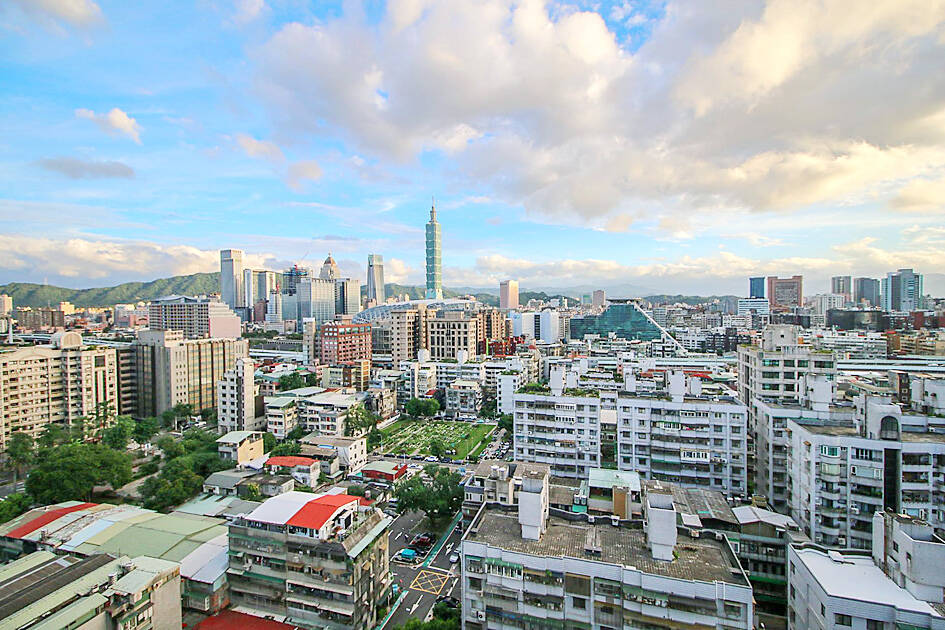Taiwan’s property market is cooling fast, with sellers across seven major cities conceding the steepest discounts since the COVID-19 pandemic, as tighter mortgage terms and faltering demand sap confidence, Evertrust Rehouse Group (永慶房產集團) said yesterday.
The average gap between asking and closing prices widened to 10 to 12 percent last quarter, from single-digit percentages at the peak of last year, as price concessions helped expedite deals, the real-estate brokerage said.
Taipei led at 12.8 percent, followed by New Taipei City at 11.5 percent, Tainan at 11.1 percent and Kaohsiung at 10.7 percent, it said.

Photo courtesy of Evertrust Rehouse Group
Taoyuan, Hsinchu and Taichung neared double-digit percentage levels that would have been unthinkable a year ago, it said.
“High net worth buyers remain selective and sellers have little choice but to budge,” Evertrust deputy research head Chen Chin-ping (陳金萍) said. “Financing is no longer friction-free and sentiment has turned conservative.”
Pricing differences in the seven cities fell below 10 percent — with some districts as low as 7.2 percent — at the market’s high point in the second quarter of last year, Chen said.
The mood shifted in September last year when the central bank implemented loan-to-value limits on second homes and restricted lending terms for developers, she said.
Transactions have since wilted, with only 63,000 transfers registered nationwide in the first three months of this year, a 20 percent drop from a year earlier and the weakest showing in eight years, Evertrust said.
The unpredictable shifts in US trade policy and the local currency’s fast appreciation cast further shadows over the economic outlook globally and domestically, it said.
Cutting prices to secure deals is the key to breaking the current stalemate in the housing market, Chen said.
“Homeowners who want to exit quickly should follow market trends and adjust their listing prices in a timely fashion,” she said. “Otherwise, transactions will struggle to rebound and the market’s sluggishness will persist.”
Buyers, for their part, need to monitor price movements closely and choose their entry point in a reasonable manner, she said.
In related developments, Taiwan’s household size is shrinking, as demographics turn from tailwind to headwind, Sinyi Realty Inc (信義房屋) said, citing Ministry of the Interior data.
Homes occupied by one or two people rose past 3.8 million last year, constituting 49 percent of the national total, Sinyi said.
Singles already dominate Taipei, New Taipei City and Kaohsiung, Sinyi research manager Tseng Ching-der (曾進德) said, adding that small families account for more than 46 percent in Taoyuan, Taichung and Tainan.
The change in house tax rates likely lends support to the “one owner, one home” trend and so does the ever rising divorce rate, Tseng said.
The house tax rate has been reduced from 1.2 percent to 1 percent for individual taxpayers who only own one home, encouraging a small household, he said.

Micron Memory Taiwan Co (台灣美光), a subsidiary of US memorychip maker Micron Technology Inc, has been granted a NT$4.7 billion (US$149.5 million) subsidy under the Ministry of Economic Affairs A+ Corporate Innovation and R&D Enhancement program, the ministry said yesterday. The US memorychip maker’s program aims to back the development of high-performance and high-bandwidth memory chips with a total budget of NT$11.75 billion, the ministry said. Aside from the government funding, Micron is to inject the remaining investment of NT$7.06 billion as the company applied to participate the government’s Global Innovation Partnership Program to deepen technology cooperation, a ministry official told the

Taiwan Semiconductor Manufacturing Co (TSMC, 台積電), the world’s leading advanced chipmaker, officially began volume production of its 2-nanometer chips in the fourth quarter of this year, according to a recent update on the company’s Web site. The low-key announcement confirms that TSMC, the go-to chipmaker for artificial intelligence (AI) hardware providers Nvidia Corp and iPhone maker Apple Inc, met its original roadmap for the next-generation technology. Production is currently centered at Fab 22 in Kaohsiung, utilizing the company’s first-generation nanosheet transistor technology. The new architecture achieves “full-node strides in performance and power consumption,” TSMC said. The company described the 2nm process as

Shares in Taiwan closed at a new high yesterday, the first trading day of the new year, as contract chipmaker Taiwan Semiconductor Manufacturing Co (TSMC, 台積電) continued to break records amid an artificial intelligence (AI) boom, dealers said. The TAIEX closed up 386.21 points, or 1.33 percent, at 29,349.81, with turnover totaling NT$648.844 billion (US$20.65 billion). “Judging from a stronger Taiwan dollar against the US dollar, I think foreign institutional investors returned from the holidays and brought funds into the local market,” Concord Securities Co (康和證券) analyst Kerry Huang (黃志祺) said. “Foreign investors just rebuilt their positions with TSMC as their top target,

H200 CHIPS: A source said that Nvidia has asked the Taiwanese company to begin production of additional chips and work is expected to start in the second quarter Nvidia Corp is scrambling to meet demand for its H200 artificial intelligence (AI) chips from Chinese technology companies and has approached contract manufacturer Taiwan Semiconductor Manufacturing Co (TSMC, 台積電) to ramp up production, sources said. Chinese technology companies have placed orders for more than 2 million H200 chips for this year, while Nvidia holds just 700,000 units in stock, two of the people said. The exact additional volume Nvidia intends to order from TSMC remains unclear, they said. A third source said that Nvidia has asked TSMC to begin production of the additional chips and work is expected to start in the second